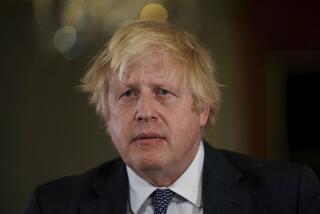Brown’s stock rises in financial crisis
LONDON — In a country that practically invented irony, Gordon Brown’s return from the political dead should probably come as no surprise.
The British prime minister, written off as finished just two weeks ago, has clawed his way back up the opinion polls, thanks to the financial crisis dragging down banks and stock markets worldwide. With Britain particularly hard hit, Brown is hammering on the theme that only he has the experience to prevent a calamity.
Plenty of voters seem to be buying the argument. That infuriates Brown’s rivals, who retort that the man offering to rescue Britons from the brink of ruin is the one who drove them to it.
As chancellor of the exchequer, Britain’s top finance official, for a decade until his elevation to the premiership last year, Brown more than anyone was identified with the country’s boom. London reasserted itself as a global financial center, property prices reached ear-popping heights, and Brown once declared that the cycle of “boom and bust” was a thing of the past.
Now, the housing market has nose-dived, banks are in danger of going under and unemployment is at its worst in nine years.
Yet in a make-or-break speech last month at a Labor Party conference, which pundits deemed one of his best, the normally blunt and dour Brown argued forcefully that it is not the time to hand over power to “a novice” -- a swipe at both the leader of the opposition Conservatives and a young challenger in his own party.
Since then, Brown’s deficit in the polls has been cut in half, although the improvement is really more a migration from hell to purgatory. The Conservatives, or Tories, remain ahead by about 10 percentage points.
“The Americans call it a ‘Hail Mary,’ the last-ditch moment in American football when the quarterback makes a desperate forward pass,” commentator Patrick Wintour wrote in the Guardian newspaper. “Normally the tactic fails, but in Gordon Brown’s case the throw looks for the moment as if it could yet save him. . . . He is back in the game.”
A dramatic reshuffle of the Cabinet on Friday, including the return of a media-savvy rival with whom Brown has had prickly relations, was seen as another move to shore up confidence in his government.
Brown’s revival of fortune is a blow for David Cameron, the amiable Tory leader, who found his keynote address at his own party conference this week drowned out by the buzz over Brown and the drumbeat of bad news out of the City, London’s financial district.
“The Conservatives have tried to make that point . . . [that] this is the world created by Gordon Brown, chancellor, now being sorted out by Gordon Brown, prime minister,” said Tony Travers, a political analyst at the London School of Economics. But “in national crises, people will generally move towards the government. They won’t, for a while, ask how we got there.”
For a while, it was Brown who had to ask himself how he got to where he was: from a honeymoon after taking over 10 Downing St. from his glad-handing predecessor, Tony Blair, to the ignominy of being one of the most unpopular prime ministers in British history, judging by the polls.
Not long after taking office in June 2007, Brown toyed with the idea of calling elections to win a popular mandate. He floated the possibility through proxies but then decided against it, leaving the impression that he was a ditherer instead of a leader.
Brown’s ratings sank swiftly thereafter as his government was hit by various debacles: sensitive computer data lost by civil servants, devastating election losses in previously safe Labor areas, an embarrassing U-turn over abolition of Britain’s lowest tax bracket.
In May, it had come to this: Brown was cold-calling voters who had written him letters of complaint.
An ally described him as a “brilliant conversationalist.” Opponents were not so kind.
“I can’t imagine anything worse than waking up to the sound of Gordon Brown bellowing statistics in your ear,” opposition politician Francis Maude said at the time.
It is unclear whether Brown’s bounce in the polls has staying power. As in the U.S., party conferences here usually give their leaders a boost.
A better barometer will be a special election at the beginning of November for a parliamentary seat out of Scotland, a hitherto safe Labor constituency that is liable to fall to the Scottish Nationalist Party.
Nervously watching will no doubt be the Labor member of Parliament from the adjoining district.
His name? Gordon Brown.
--
More to Read
Sign up for Essential California
The most important California stories and recommendations in your inbox every morning.
You may occasionally receive promotional content from the Los Angeles Times.











